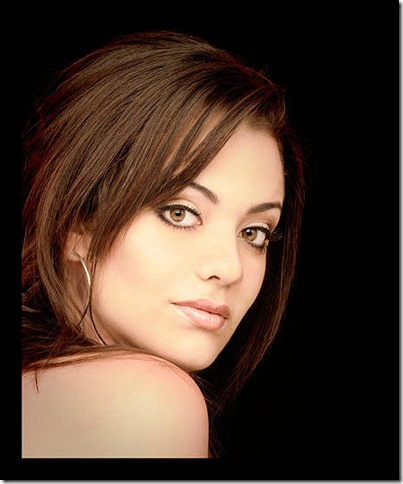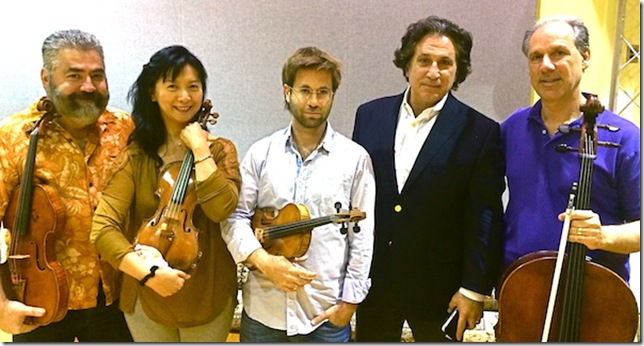For two centuries or more, the string quartet has been the favored medium for a composer’s most intimate, profound thoughts.
In his series of quartets, the American composer Richard Danielpour has explored themes of the Holocaust (No. 3, Psalms of Sorrow) and farewell (No. 6, Addio), and for his Quartet No. 7, which received its world premiere May 31 in Coral Gables at the Mainly Mozart Festival, he has turned to a more hopeful message of human potential.
Played by the Delray String Quartet, with Cuban-born soprano Maria Aleida singing in the final movement, the Seventh Quartet (Psalms of Solace) proved to be a tightly written, strongly communicative work of predominantly slow, deliberative music that built steadily to a gently radiant finale. All four of the movements were relatively short, a specific choice by the composer, who cut a second scherzo that would have turned the quartet into a five-movement work. But the music is such that the piece overall is a little too concise.
Danielpour’s language throughout the quartet, even in the hard-driving second movement, is stripped-down and hewn from plain wood. The opening four-note motif that unfolds into a major third is heard throughout the work, as is a falling scale first presented in the first violin after the other three strings move quietly between a series of elemental major chords. The rest of the movement keeps up the somber, gentle mood in which the dynamics rise to forte only twice. It’s an inward, searching music, akin to that of Shostakovich in one of his contemplative passages.
The Delray quartet, which had the recorded the piece the week before with producer Judith Sherman, played with precision and care, keeping the half-light of the music steady. The second movement (marked Presto) also suggested Shostakovich in its insistent rhythmic patterns and melodic fragments that rise out of the background chatter for a ghostly flitter. But Danielpour’s harmonies are not as brusque, and the five-note hammerblow pattern that keeps breaking in has shifting chords that add an unexpected lyricism to the pattern.
Well-played as it was, I would have welcomed some more dynamic contrast between highs and lows from Delray players. It sounded somewhat more cautious than it could have been, and the contrast between it and the other three movements would have been more striking had it been played with more force.
The lovely third movement (Adagietto) makes use of the same kinds of gestures as the first movement does, with quietly unfolding chords and falling scales, but here the scale becomes part of an explicit melody, a sweet, sensitive song that leads without pause into the finale. Danielpour has chosen biblical texts from Old and New Testaments (Psalms, Isaiah and Luke), beginning in Hebrew as the singer calls upon God and ending in English as she sings that “the Kingdom of God is within you.”
The quartet plays a mostly supporting role in the finale as the soprano floats above with rising incantatory lines, in a cannily scored accompaniment that has texture but still lets the singer have the spotlight. Aleida, a lyric coloratura who has been specializing in bel canto, has a large, strong voice with nice coloring and an ease of access to her upper registers that was enviable. She filled the packed Alhambra Ballroom at the Biltmore Hotel with her instrument, and gave the final movement of the quartet a beautiful performance.
Danielpour’s Seventh Quartet is a well-constructed, deeply felt piece that would make a good addition for a string quartet ensemble looking for some programming variety and some easy-to-grasp contemporary composition. It seems to me that the fourth movement is actually too short to make the best impact it could, even given whole slow movement before it. It has a Mahlerian pace from the beginning of the Adagietto, and it’s a pace that calls for serious breadth.
Aleida also joined the Delray for a work by Mozart, the motet Exsultate, jubilate (K. 165), a motet that suits her voice admirably. Written for the castrato Venanzio Rauzzini when Mozart was not quite 17, it is designed for an operatic athlete, and in that, Aledia certainly filled the bill. Her voice is not just big, it’s deployed with lightness and accuracy, and her interpolated high F in the first section and high C at the end were perfectly placed and hit with no sign of strain. The same was true of her melismas, which were fluid and well-supported. It was a natural, confident performance, engaging and lovely, and the audience adored it.
The concert opened with a reduction (the Mozart, too, was reduced from the original) of the third of Ottorino Respighi’s suites of Ancient Airs and Dances. The Delray quartet — violinists Mei Mei Luo and Tomas Cotik, violist Richard Fleischman and cellist Claudio Jaffé — played it with suavity and a good feeling for its reverent Romanticism. Fleischman’s very pretty playing of the first air in the second-movement Arie di corte was a highlight.
The quartet also performed another work by a precocious teen, the String Quartet No. 10 (in E-flat, D. 87), by Franz Schubert, composed in 1813. It’s not mature Schubert, and it sticks close to the home key, but it’s a fine example of the kind of music written for home performance that was the dominant market at the time.
In its 11 years, the Delray String Quartet has focused primarily on music written from the late 19th century on, and its forays into the quartets of the canonical Viennese masters have been mixed successes, with Haydn coming out best, Mozart and Beethoven less so. But on this Sunday, there was a notable difference, perhaps because the four players had just been through an intense ensemble week recording three Danielpour quartets, and probably also because they were offering a world premiere.
The caution and focus that was on display for the Danielpour Seventh worked to the group’s advantage in Schubert’s quartet, with a keen sense of balance, consistent ensemble sound and an avoidance of anachronistic Romanticisms. If the second-movement Beethoven hommage was a little on the slow side, and the third movement slow movement too reserved, overall this was good Schubert, and Schubert as the composer intended it: A modest, charming piece for a day of homey music-making.
The Mainly Mozart Festival continues today with violinist Jinjoo Cho in her Miami debut, performing works by Mozart (the Sonata No. 21 in E minor, K. 304), the youthful Violin Sonata (Op. 18) of Richard Strauss, and the Carmen Fantasy showpiece of the film composer Franz Waxman; the pianist is Mainly Mozart artistic director Marina Radiushina. The recital is set for 4 p.m. at the Country Club Ballroom in the Biltmore Hotel, Coral Gables. Tickets are $20. Call 786-556-1715 or visit www.mainlymozart.com.

